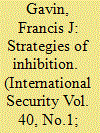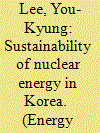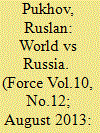|
|
|
Sort Order |
|
|
|
Items / Page
|
|
|
|
|
|
|
| Srl | Item |
| 1 |
ID:
191596


|
|
|
|
|
| Summary/Abstract |
This study investigates the effect of political orientation on public trust in Hong Kong’s courts. In measuring institutional legitimacy, the prior literature, predominantly written in the US context, largely focuses on the police force and demographic factors. Building on previous studies of the role of procedural fairness in determining the degree of institutional trust, this article contributes to a strand of developing literature which highlights how political ideology may color one’s views of legal authorities. Based on a 2020 survey on public trust in Hong Kong’s courts, this article presents a sobering portrayal of a hitherto “most trustworthy institution” in Hong Kong’s deeply polarized and rapidly changing political environment.
|
|
|
|
|
|
|
|
|
|
|
|
|
|
|
|
| 2 |
ID:
140915


|
|
|
|
|
| Summary/Abstract |
The United States has gone to extraordinary lengths since the beginning of the nuclear age to inhibit—that is, to slow, halt, and reverse—the spread of nuclear weapons and, when unsuccessful, to mitigate the consequences. To accomplish this end, the United States has developed and implemented a wide range of tools, applied in a variety of combinations. These “strategies of inhibition” employ different policies rarely seen as connected to one another, from treaties and norms to alliances and security guarantees, to sanctions and preventive military action. The United States has applied these measures to friend and foe alike, often regardless of political orientation, economic system, or alliance status, to secure protection from nuclear attack and maintain freedom of action. Collectively, these linked strategies of inhibition have been an independent and driving feature of U.S. national security policy for more than seven decades, to an extent rarely documented or fully understood. The strategies of inhibition make sense of puzzles that neither containment nor openness strategies can explain, while providing critical insights into post–World War II history, theory, the causes of nuclear proliferation, and debates over the past, present, and future trajectory of U.S. grand strategy.
|
|
|
|
|
|
|
|
|
|
|
|
|
|
|
|
| 3 |
ID:
177117


|
|
|
|
|
| Summary/Abstract |
The purpose of this study is to examine the impacts of nuclear energy risk perception, benefit perception, and political orientation on nuclear energy consumption behaviour from the nuclear energy users' perspectives. The existing studies on nuclear energy acceptance have mainly used local or public acceptance as outcome variables with a single dimension and haven't considered users' risk and benefit perceptions as multi-dimensional constructs. Therefore, this study examines the impacts of nuclear energy risk and benefit perceptions at social and personal levels on the attitude and usage intention towards nuclear energy. In addition, this study examines the relationships between political orientation, attitude, and usage intention towards nuclear energy. This study conducted hierarchical multiple regression analysis on 312 samples collected through random sampling from each region in Korea through the stratified sampling method. This study found that users with lower social and personal risk perceptions of nuclear energy and with higher social benefit perception of nuclear energy tend to have more positive attitude towards nuclear energy, and greater usage intention of nuclear energy. And this study also found that conservatives and authoritarians show more positive nuclear energy consumption behaviour than socilaists and libertarians. From these findings, the study discusses practical and theoretical implications for nuclear energy policies in Korea.
|
|
|
|
|
|
|
|
|
|
|
|
|
|
|
|
| 4 |
ID:
126467


|
|
|
|
|
| Publication |
2012.
|
| Summary/Abstract |
Despite a multitude of various official doctrines and concepts, the Russian approach to strategic policy and national defence planning still remains internally inconsistent and haphazard. The Russian National Security Doctrine-2020, approved by erstwhile President Dmitry Medvedev in May 2009 (and clearly developed under the guidance of Vladimir Putin) is largely devoid of any political commitments or meaningful strategies. The situation results from the fact that Russia has yet to overcome the crisis of national identity since the break-up of the former Soviet Union. The Russian nation and the political elite have not yet reached a comfortable level of consensus regarding post-Soviet Russia's national goals, values and political orientation. That is why Russian politics is an odd mix of the old and the new; Russia wants to modernise, but it also wants to keep its old values. Part of it wants to be pro-West, but another part remains staunchly anti-West. This conflict stands in the way of clearly defining the national goals, as well as the objectives to be set before the Russian armed forces, the nature of the threats for the country, and the list of its potential adversaries. Answers to these important questions are often being given 'on the hoof', often as a knee-jerk reaction to whatever challenges, threats or problems the country happens to be facing at any given moment. This fundamental deficiency defines the current state of Russian foreign and defence policy, as well as Russian strategic planning.
|
|
|
|
|
|
|
|
|
|
|
|
|
|
|
|
|
|
|
|
|